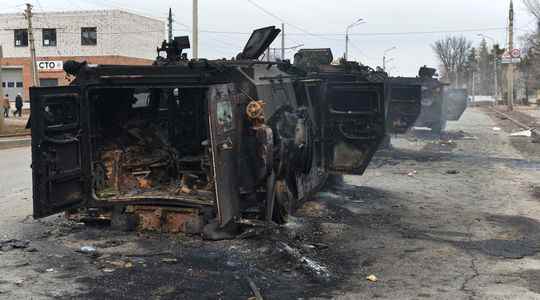After the failure of his lightning offensive, can Putin turn to a way out of the diplomatic crisis? The hypothesis has come back to the fore in recent days following declarations to this effect from each of the two parties. At the beginning of the week, one of the Russian negotiators had thus reported “significant progress” in the ongoing talks and indicated that he hoped “very soon a common position”.
For his part, Ukrainian President Volodymyr Zelensky then agreed to a major gesture on Tuesday March 14, saying he was ready to “recognize” that Ukraine could not join NATO, one of the demands of the Kremlin. Then, the next day, the Russian Foreign Minister, Sergei Lavrov, mentioned a possible “agreement” on a status of neutrality for Ukraine, on a model comparable to that of Sweden or Austria. A proposal that could theoretically leave Ukraine the possibility of determining its internal policy and joining the European Union.
Russian military difficulties
Should we see a Russian inflection there? “We must always remain cautious vis-à-vis the various statements from Moscow, which sometimes serve as a smokescreen. But it could be the sign of a beginning of openness towards a more constructive way out of the diplomatic crisis”, considers Benjamin Haddad, Director of the Europe Center of the Atlantic Council. “We cannot exclude that the Russians are revising their objectives downwards, because they are in difficulty militarily.”
On the ground, the Russian invasion actually seems to be marking time. Faced with fierce Ukrainian resistance, the Russian army still stumbled upon the major cities – subjected to intense bombing – and struggled to record real military successes. In kyiv, the Ukrainian capital, the Russian attempt to encircle has still not succeeded, suggesting long months of clashes. And at the same time, the death toll continues to climb among Putin’s troops. According to American estimates, more than 7,000 Russian soldiers have been killed since the start of the conflict on February 24. A figure that would be, if proven, higher than the number of American soldiers killed in 20 years of war in Iraq and Afghanistan.
In this context, an adviser to the Ukrainian president said on Monday March 13 that a peace agreement could see the light of day by the month of “May”, the depletion of resources on the Russian side no longer allowing Moscow, according to him, to sustain the war effort sufficiently from that date. “The rebalancing of the balance of power on the ground can push the Kremlin to reassess its initial war aims and to seek a way out”, confirms Benjamin Haddad.
For the time being, without completely ruling out the idea of possible neutrality, Ukraine has rejected the Russian proposal, and called for the designation of countries to guarantee its security and ready to defend it in the event of future aggression by Russia. . During an interview with German Chancellor Olaf Scholz on Friday, Vladimir Putin in return accused the Ukrainian government of “dragging the process of negotiations, by putting forward new unrealistic proposals”.
Western skepticism
Reaching a mutually acceptable agreement promises to be extremely complex. Moreover, in the Western chancelleries, skepticism dominates as to the real intentions of the Kremlin. On Thursday, French Foreign Minister Jean-Yves Le Drian accused Moscow of “pretending to negotiate”, preferring in reality to continue to “make arms speak”. Similarly, US Secretary of State Antony Blinken declared a few hours later that he had not seen “a significant effort on the part of Russia to put an end to the war through diplomacy”.
“Despite the few signals sent on the diplomatic level, I find it hard to see Putin accepting major concessions, abounds the historian specializing in Russia Françoise Thom. He considers that Russians and Ukrainians are one and the same people, and it is intolerable for him that there is a regime different from his in kyiv.”
Alongside the ongoing diplomatic efforts, concerns are also growing around a Russian headlong rush into violence, to bend kyiv by all means. “Russia is making absurd accusations about biological laboratories and chemical weapons in Ukraine (…) We are concerned that Moscow could organize a clandestine, false flag operation, possibly including chemical weapons”, alerted Tuesday NATO Secretary General Jens Stoltenberg.
“It’s a real risk: we know that when the Russians start to blame their opponent for something, it’s usually that they intend to do it themselves”, points out Benjamin Haddad. Not sure that diplomacy won’t be necessary anytime soon.
